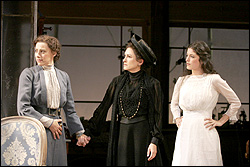I don’t know why Intiman rescinded invitations to its originally scheduled Wednesday press opening of Three Sisters (through Saturday, July 9; 206-269-1900 or www.intiman.org) at the last minute. Theater Communications Group visitors who caught the first night reportedly liked it; by the time I saw it on Sunday, the production was polished to such a high gloss you could see yourself in it.
But I know why director Bartlett Sher was nervous. Chekhov is like a high-risk Grand Prix course, with little piles of bones at every hairpin turn indicating those who didn’t make it. Every busy evasion and collision on that mazelike road that does not lead to Moscow must look artlessly spontaneous. And so they do in Sher’s delicate production of the rather muscular translation by Craig Lucas (who last collaborated for Lucas’ Singing Forest and the Broadway transfer of his The Light in the Piazza).
From her first silent moment— imperiously recumbent on a chaise at center stage—the standout is Julie Dretzin’s Masha, the sister who’s bitterest about the siblings’ captivity in an infinitely provincial town. Dretzin is a coal glowing black with banked rage, inclined to flare with lurid passion. Dretzin’s harsh brilliance plays well against the warmer tones of Judy Kuhn’s Olga, the sensitive big sister who yearns for marriage—say, to someone unlike Masha’s icy schoolmaster mate, Kulygin, who can conjugate “love” in Latin but is not what you’d call a Latin lover. Larry Paulsen superbly captures Kulygin’s deep creepiness as he reassures Masha about how “content” he is with their liquid-nitrogen state of holy deadlock.
As kid sister Irina, Alexandra Tavares is the giddiest and spindliest of the Muscovite wanna-bes—as she’s supposed to be, yet slightly more than she should be. Dretzin and Kuhn are pipe organs; she’s a toy piano. Mostly, that’s all right, though at times Tavares’ callow-ness breaks through the character and makes a little rip in the gauzy membrane of effortlessness.
Assisted by Lucas’ succinct, prosaic text, Sher nicely renders the play’s burly satirical humor. Andrew Weems is skillfully ridiculous as the cuckold brother Andrey, who loses the sisters their house; Kristin Flanders, as his small-minded small-town spouse, Natasha, is funny because she’s touchingly sympathetic before she becomes an authentic monster. Michael Winters is so amusingly, ursinely gregarious as the death-dealing doctor Chebutykin that I fear some lazier playgoers missed the deepest glints of his vile nihilism. Sam Catlin and Jay Goede execute the philosophical pseudo-duels of the soldiers Tusenbakh and Vershinin with deadeye accuracy that leaves both arguments risibly plugged full of holes. Yet the jokes are always jittery—the laughs are on the characters’ dreams. The show grows in greatness with each scene, the momentum gathering inexorably until it all ends in spectral stasis.
If your job is to be vigilant in stern judgment, you’ll be obliged to note small elements that lessen the greatness: The sounds of carnival gaiety offstage are winningly poignant—just out of everyone’s reach—but shouldn’t that offstage fire feel a bit scarier and more searing? When Irina settles for a homely soldier, how come the actor is actually slightly handsomer than she is?
But such cavils make me feel like the pedant pedagogue in the play. If, unlike Kulygin, you have a soul, this Three Sisters will touch it.








